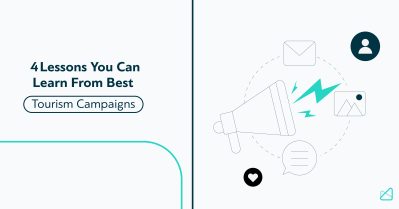How To Generate Leads For Travel Business: The 6 Best Strategies

Wondering how to reach your potential guests? Today’s traveler uses a variety of avenues to research and book their trips – including both online and offline methods. If you want your travel business to be visible to potential guests, you need to set up a marketing strategy that will effectively generate leads and convert bookings. In this article, we’ll cover several options for lead generation, including digital marketing and working with travel agents. By the end of the article, you’ll be ready to implement at least one new strategy today!
1. Search Engine Optimization
You’ve likely heard about search engine optimization, but do you really know what it is? In short, search engine optimization, or SEO, ensures that search engines (like Google) can find your website and put it in front of people who are searching for what you offer. There are a few key components of SEO, including informative content, clear formatting, links, and speed. You should also include common keywords that your target audience is searching for. SEO is a crucial piece of your digital marketing strategy because without it, potential guests or customers will not be able to find your website.
What does SEO look like in practice? Let’s say that you manage a hotel in Downtown San Diego. After researching your target keywords (LSI Graph is a great tool for keyword research), you find out that many potential guests are searching for “san diego hotels downtown,” so you decide to update your website text to include “Looking for one of the best San Diego hotels downtown? We offer clean, comfortable rooms at our San Diego hotel near the Gaslamp District.”
2. Pay-Per-Click Ads
Sometimes SEO isn’t enough to get your website in front of your target audience or to get the results you desire. Pay-per-click ads, or PPC, are featured listings in search engine results that you pay for every time someone clicks on them. Websites bid on the ad placement in an auction, in which the highest bidder wins the spot. You can set up pay-per-click ads on the major search engines like Google or Bing or on specific travel sites like Expedia and Tripadvisor.
When we search for “san diego hotels” on Google, the first two results are ads:
These paid results are completely customizable, so you can add content, promotions, or links that will encourage travelers to click onto your page.
3. A Great Website
Of course, all of your SEO and PPC efforts will fall flat if you don’t have a great website! Your travel business should have a website that communicates everything that a guest or customer needs to know in order to make a booking. You’ll want to upload high-quality photos, contact information, reviews, and answers to frequently asked questions. You may even consider using a sales funnel, which is a popular digital marketing strategy that guides customers through the purchase process.
A good website doesn’t need to be packed with bells and whistles; simple is often best. Focus on clearly articulating what your travel business offers and make the “book now” button easy to find. You’ll also want to ensure the website looks nice on a desktop computer, a tablet, and a smartphone. And don’t forget to ask a friend or family member to test your website – they’ll let you know which pages are confusing or difficult to use.
4. Partnering with Travel Agents
For many travel businesses, an essential component of their marketing strategy is to develop and maintain relationships with travel agents. Travel agents will put your product in front of their loyal clients and handle the entire sales process for you. While you’ll need to offer a travel agent commission – and perhaps some exclusive promotions, travel agents can be valuable partners in the long run.
If you don’t have a few travel agents on speed dial quite yet, consider joining a local travel industry association or attending a travel trade show. Networking events are a great way to meet travel agents and learn more about this segment of the industry.
5. Partnering with Bloggers
While some travelers rely on the expertise from their trusted travel agent, many travelers choose to do their own research. But today’s travelers aren’t finding their travel intel in a guidebook; they’re finding it on blogs. Travel bloggers often provide detailed, objective information about destinations, hotels, tours, restaurants, and transportation. Some bloggers have built followings of thousands (even millions!) of readers who trust their advice time and time again – so they can provide fantastic exposure for your brand.
Your travel business can partner with a blogger by asking them to write a blog post about your business, usually in exchange for a free trip (or hotel stay or tour) or monetary compensation. While it can be tempting to work with the bloggers with the biggest audiences, you may actually see the biggest return on investment when you work with niche blogs with readers who fit your target demographic. Niche sites could target families, millennial travelers, LGBTQ travelers, eco-conscious travelers, and more.
Curious to see what this strategy looks like in real life? This blog post includes an honest review of an Alcatraz tour that the blogger wrote in exchange for free tickets.
6. Referral Programs
As the saying goes, your customers are also your best salespeople. If you provide a five-star experience, people will want to tell their friends and family about it, but offering a little extra incentive via a referral program will ensure that they spread the word.
Referral programs can include freebies, credits for future bookings, or even gift cards. If your travel business focuses on one specific geographical area, then you’ll want to think about referral bonuses that will be attractive even to guests or clients even if they don’t book your product often.
Eager to generate leads? Which strategy will you implement first: SEO, PPC ads, fine-tuning your website, partnering with travel agents or bloggers, or setting up a referral program? Taking the first step toward a more comprehensive marketing strategy will put you on the right track toward more leads, more bookings, and more revenue.
Subscribe to
our newsletter
Yay! You are now
subscribed to our
newsletter
Mize is the leading hotel booking optimization solution in the world. With over 170 partners using our fintech products, Mize creates new extra profit for the hotel booking industry using its fully automated proprietary technology and has generated hundreds of millions of dollars in revenue across its suite of products for its partners. Mize was founded in 2016 with its headquarters in Tel Aviv and offices worldwide.
Related Posts

Opening Up to New Markets While Maintaining the Brand
8 min. Case study of adapting the Mize brand for the East Asia market Making a cultural adjustment – finding the balance between global and local The process of growing globally can be very exciting and, at the same time, challenging. Although you are bringing more or less the same products and vision, the way […]

Travel Niche: What It Is, How to Leverage It, Case Studies & More
14 min. Niche travel is one of the few travel sectors that have maintained their pre-COVID market growth. By catering to specific traveler segments, niche travel developed products around adventure travel, eco-tourism, LGBTQ+ travel, and wellness retreats. Take adventure tourism as only one segment of the niche tourism market. In 2021, it reached 288 billion […]

4 Lessons You Can Learn From the Best Tourism Campaigns
13 min. Businesses in the tourism industry rely heavily on marketing to generate leads and boost conversion rates. Tourism marketing is as old as tourism itself – and it always reflects the destination and service benefits relevant to the current travelers’ needs, wants, and expectations. In other words, tourism campaigns must constantly move forward, and […]